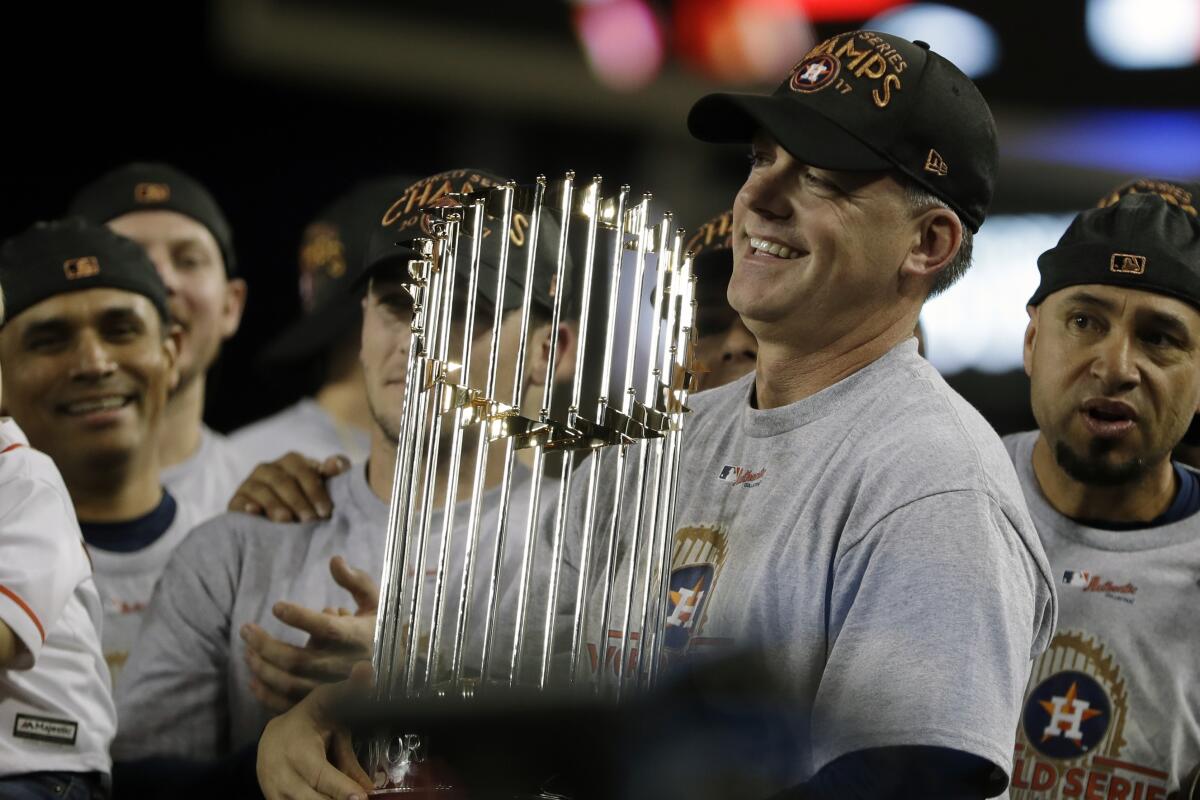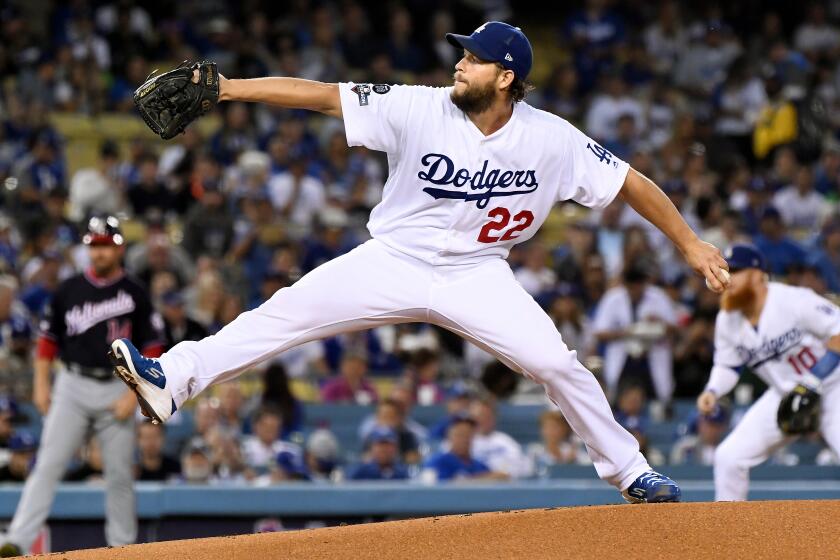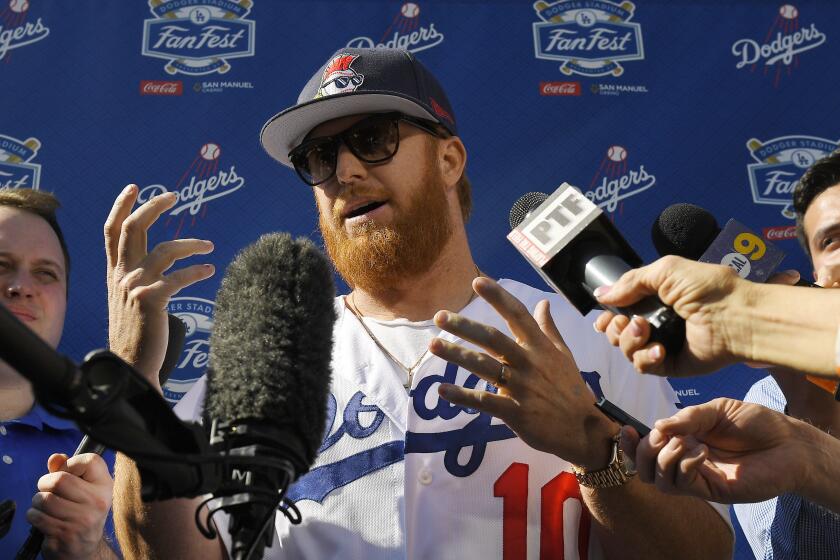Sign-stealing scandal: Should MLB restrict the use of technology or embrace it?

- Share via
This used to pass for baseball analysis: “He hit the ball a country mile.”
No disrespect toward previous generations of broadcasters, but any announcer making that comment today would be mocked and derided. That call has been transformed by technology.
We know exactly how fast the pitch was thrown, how far the ball traveled, how hard it was hit and at what angle. Each of those measurements can represent one bit of feedback toward determining the effectiveness of a hitter, or what tweaks he might need to make to his swing.
As baseball tries to learn from the Houston Astros’ cheating scandal, what ultimately represents the biggest challenge facing Commissioner Rob Manfred is this: How can technology be banned in one area and embraced in every other?
A hitter can review video on his tablet at home or in the clubhouse — before, after or during a game. The pitcher he is about to face can do the same. So can the coaches determining where to position the players. Video and advanced data are an accepted part of preparation and evaluation throughout baseball.
In his first public comments about the Astros cheating during the 2017 World Series, Dodgers pitcher Clayton Kershaw addressed getting shelled in Game 5.
However, the Astros cheated by using the center-field replay camera for their own nefarious purpose. Perhaps the league could do a better job of controlling who can see that feed during games, or who can get into the replay review rooms during games, or whether players and coaches should have access to the clubhouse during games.
The advent of instant replay is a case study for the advent of technology: remarkable progress, eventually followed by unforeseen consequences.
When the league entrusts the determination of balls and strikes to a computer program rather than to a human umpire — and Manfred has made clear that day is coming — does anyone really believe teams will not try to find a way to game that system to their advantage? Just spitballing here, but that version of the Astros scandal could be one in which a team hacks the system so that the strike zone is a bit smaller for its hitters than for its pitchers.
That might be the future. In the present, teams use technology for training hitters and pitchers, for scouting the next day’s pitcher and the next summer’s draft picks, for pricing and distributing tickets, for providing the right number of hot dogs and for producing entertainment that accompanies the game.
Teams are no more likely to rip out the speakers and return to soft organ music than they are to rip out the computers and advise players to work with a coach who tells them to swing down on the ball and choke up with two strikes. Is it unfair to tell a player he can check his swing, or check his delivery, on a computer at 6 p.m. but not at 8 p.m.?
“As long as there’s a level playing field for all 30 teams, I really don’t care what it is. It’s when there’s not a level playing field where I have an issue with it.”
— Andrew Friedman, Dodgers president of baseball operations, on the use of technology in the sport
In this case of sign stealing, isn’t the answer what it always has been? If a team doesn’t want its signs stolen, shouldn’t it do a better job of protecting them? Why is it accepted to steal signs using a human on second base but not using a camera in center field?
This is not to excuse the Astros. They broke the rules and they got caught. But perhaps the rules need loosening, not tightening.
Ross Stripling thought about it. The Dodgers pitcher is devoted to his analytics. Do not stand between him and his computer.
“Technology is definitely a part of the game,” Stripling said Saturday at the Dodgers’ fan festival. “I can’t imagine not using the analytics we get on the pitching side now, and not being able to use them to my advantage.”
The advantage he got, he said, was not the one the Astros got.
Several Dodgers made their first comments about the 2017 Astros’ sign-stealing. ‘They cheated,’ Enrique Hernández said. ‘They got away with it.’
“It’s an advantage I create between games or between innings,” he said. “It’s not an advantage I get in real time, like they were. It alters the game. You can sit here and use all the sign sequences in the world, man, and they can still have people break them, and they can still relay stuff in real time.”
Maybe the pitcher and catcher could wear earpieces, just as players in the NFL do. Maybe a sequence of flashing lights could be harder for the opposing team to decode than the sequence of wagging fingers presented by a catcher.
But, the way Stripling sees it, the league has a fundamental reason to police technologically enhanced sign stealing, rather than just tell him and his catcher to do a better job of protecting the signs.
“At the end of the day, MLB is really focused on making the game more efficient, right?” he said. “Now, all of a sudden, I’m using eight different sign sequences with no one on base, and the games are 4½ hours long?
“I think you’ve got to draw the line somewhere, and it would be giving someone an advantage in real time.”
Andrew Friedman, the Dodgers’ president of baseball operations, said the league has asked teams to provide recommendations on the use and abuse of technology. Under Friedman, the Dodgers have devoted resources in pursuit of every conceivable edge, not only in hitting and pitching but in areas such as player nutrition and mental health.
If the Dodgers believe they can win more games because they have an ace department of player nutrition or mental health, why shouldn’t they try to win more games because they have an ace department of research and development?
Should the league allow teams to fully embrace technology rather than try to regulate it?
Friedman did not say no.
“It’s a really good question,” he said. “As long as there’s a level playing field for all 30 teams, I really don’t care what it is. It’s when there’s not a level playing field where I have an issue with it.
“Whether it’s all hands on deck and whatever goes, or whether it’s take away all technology, I’m not sure what the right answer is. All I really care about is a level playing field.”
More to Read
Are you a true-blue fan?
Get our Dodgers Dugout newsletter for insights, news and much more.
You may occasionally receive promotional content from the Los Angeles Times.













